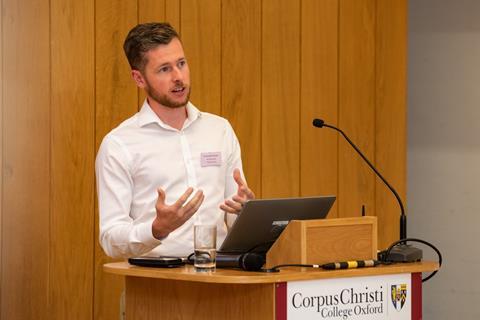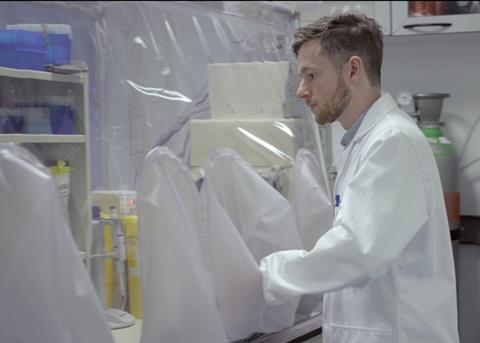Dr Christopher Stewart of Newcastle University in the UK has been named as this year’s winner of the WH Pierce Prize for microbiology.

The prize is part of the Applied Microbiology International Horizon Awards, which celebrate the brightest minds in the field and promote the research, group, projects, products and individuals who continue to help shape the future of applied microbiology.
The prestigious WH Pierce Prize is presented to a microbiologist who has used microbiology to make a significant contribution to One Health advancements. The WH Pierce Prize is sponsored by the family of WH Pierce and ThermoFisher Scientific, one of the world’s largest manufacturers and distributors of microbiological media and other diagnostic materials.
Prestigious event
Dr Stewart was named as winner at the prestigious EMI lecture 2023, held at BMA House in London on November 16.
The primary goal of his research programme is to define how breastmilk bioactive components and the gut microbiome contribute to short- and long-term health in preterm infants.

This work relies on the Great North Neonatal Biobank - established by Dr Janet Berrington, it is the world’s largest neonatal biobank.
“This has allowed my research group to study the abnormal bacterial colonisation in preterm infants and its association with sepsis and necrotising enterocolitis (NEC), an inflammatory mediated bowel disease representing the leading cause of death in preterm infants,” Dr Stewart said.
Human milk protection
“Mothers’ own milk (MOM) is the most protective factor against NEC in preterm infants and I have a longstanding interest in MOM and how this directly and indirectly (i.e., through modulation of the infant gut microbiome) impacts infant outcomes.
“For example, with collaborators around the world, my group has extensively studied MOM bioactive components such as human milk oligosaccharides (HMO) and secretory immunoglobulin A (sIgA). Such work has shown important differences in MOM received by infants who go on to develop NEC and we are actively studying the potential mechanisms in my lab.

“At the core of this is using a range of microbiology techniques, alongside a novel intestinal organoid co-culture system that allows diet-microbe-host interaction to be investigated.”
Gut microbiome
Dr Stewart said his research programme is also expanding into understanding how the gut microbiome can impact treatment response in adult inflammatory bowel disease and colorectal cancer.
“In addition, I have a long-standing passion to expand my research to underprivileged and understudied low- and middle-income countries (LMICs), which currently contribute a tiny fraction of the samples used in microbiome studies,” he said.
“In an example of such work, with collaborators (Dr Jordyn Wollenborn, Swiss Tropical Public Health Institute), we are currently recruiting a multi-country, prospective, randomised control trial and biobank (e.g., human milk and infant stool samples) among 700 mother-infant dyads in Brazil and Lao People’s Democratic Republic.
“We will conduct an integrative longitudinal analysis of human milk bioactive, micro- and macro-nutrient factors to generate a critical insight into human milk as a biological system and how this impacts infant gut microbiome and short- and long-term health outcomes.
Bedside to bench and back
“The overarching ambition through this multi-disciplinary, multi-geographical approach is to allow my translational research to move from ‘bedside to bench, and back again’.”
Dr Stewart said he was very excited that the prize fund would allow his lab group to host funded summer studentship placements.
“In my experience, undergraduate lab classes do not showcase how exciting and rewarding science can be. I hope by providing funded opportunities to be involved in our ongoing studies, we can ignite a passion for microbiology research in the next generation,” he said.
Like many of the Applied Microbiology International Awards, the WH Pierce Prize is named after a distinguished individual who has been recognised by AMI for his outstanding contribution to the field of applied microbiology.
Fine legacy
William (Bill) Henry Pierce was a long-standing member of Applied Microbiology International and former Chief Bacteriologist of Oxo Ltd, now part of the Thermo Fisher Scientific Group.
Throughout his lifetime, he made significant contributions to the improvement of bacterial culture media that are still used in a vast range of applications worldwide today. His work developing dehydrated extracts for making bacterial media culture had a significant impact on industry and made bacterial culture faster, more efficient and more reliable.
To find out more about AMI’s Grants and Awards programme, visit https://appliedmicrobiology.org/membership-community/grants-awards.html.







No comments yet